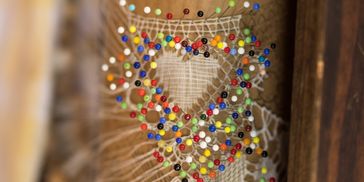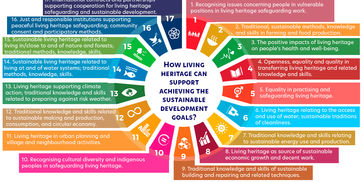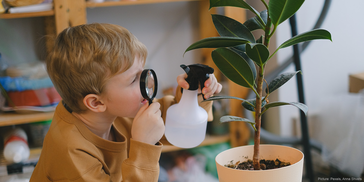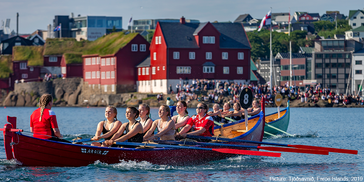
LIVIND Webinars
The LIVIND process involves a series of international online events. In this section you find webinar programmes and recordings. Following the Opening Webinar in November 2021, our webinars in 2022 focused on living heritage and its connections to the four aspects of sustainability (economic, ecological, social, and cultural sustainability). Webinar contents were prepared and planned together with our project partners making through series of meetings on virtual workspaces. In 21 November 2023 we organise another webinar to take a next step in discussing living heritage and sustainable development.
LIVIND WEBINAR: A RESOURCE AND A SOURCE FOR CHANGE? LIVING HERITAGE AND ACTIONS FOR SUSTAINABLE DEVELOPMENT
Various practical examples show that intangible, living cultural heritage connects with the efforts for sustainable development. Examples range from, for example, traditional knowledge on self-sufficiency and growing one’s own foodstuff, to practices that contribute to building and maintaining mutual trust in local communities. The UN Agenda 2030 and its 17 SDGs touch each one of us striving for a habitable planet also in the future. However, the everyday patterns of action are not always that easy to match with the goals for sustainability.
In this webinar, we take a deeper look into sustainable development in the context of living heritage. We will hear viewpoints from the everyday of living heritage safeguarding work with analytical takes on monitoring and indicators and also critical discussion on the roles of culture and cultural heritage in the Agenda 2030 and beyond. For our speakers’ panel discussion, you are welcomed to present questions and share through virtual tools your own viewpoints and experiences.
This webinar is co-organized by the LIVIND project (Finnish Heritage Agency) and the UNESCO Chair on Intangible Cultural Heritage and Sustainable Development, CY Cergy Paris Université.
Webinar Programme 21 November 2023
NB! All times in CET
14.00 Opening and introductions. Chiara Bortolotto, UNESCO Chair on Intangible Cultural Heritage and Sustainable Development, CY Cergy Paris Université; Leena Marsio, Senior Advisor, and Elisa Kraatari, LIVIND Project Coordinator, Finnish Heritage Agency
14.15 Presentation. Agenda 2030 and the SDGs: Whose sustainability and sustainability of what?
John Crowley, PHGD Group
14.40 Presentation. The SDGs, periodic reporting and the agency of indicators. Chiara Bortolotto, UNESCO chair in Intangible Cultural Heritage and Sustainable Development, CY Cergy Paris Université and Séverine Cachat, Expert for the Ethnological and Intangible Heritage Committee, French Ministry of Culture.
Introduction:
Global frameworks such as the SDGs or the audit mechanisms established within the ICH Convention build on indicators. Assumed to be neutral, technical and universal, these frameworks are in fact performative, political and cultural. It is through them that SD is to be imagined, managed, deployed and performed globally. They shape the global conception and management of sustainable development, potentially obscuring its essence. Energies and resources that could be creatively devoted to safeguarding taking into account a diversity of understanding of sustainability are instead diverted in the implementation of these normative framework . At the same time, however, they offer opportunities to shift State policies’ focus from a quest for international visibility and prestige granted by listing to more concrete issues. The Livind project is an example of this. Our discussion draws from experiences supporting state and sub-state stakeholders in designing and executing ICH strategies, reporting, and projects.
15.05 Comments to the presentations. Jorijn Neyrinck, Expert of the Intangible heritage workshop, Flanders, Belgium; Katriina Siivonen, University Lecturer, Finland Futures Research Centre (FFRC), University of Turku.
15.15 Panel discussion: Living heritage as a resource for local communities and an agent for sustainability transition. John Crowley, Chiara Bortolotto, Séverine Cachat, and Katriina Siivonen.
The Panel discussion moderator: Jorijn Neyrinck
16.00 Webinar ends.
Introductions
John Crowley is the author of the so-called Zero Draft for Culture Goal, preparing the way for SDG 18 for culture. Crowley worked for UNESCO from 2003 to 2021 leading the programmes on ethics of science and technology, global environmental change and management of social transformations. He founded PHGD in 2020 to bring together a portfolio of interests in sustainable energy and environmental regeneration.
Chiara Bortolotto holds the UNESCO chair in Intangible Cultural Heritage and Sustainable Development, at CY Cergy Paris Université. Her research explores the social life of the UNESCO Convention for the Safeguarding of the Intangible Cultural Heritage addressing in particular the intersection between heritage and sustainable development. Her work is based on an ethnography of the UNESCO policy world where she explores the performative power of administrative apparatuses and the role of human emotions in the making of global governance.
After obtaining a Phd in social and cultural anthropology, Séverine Cachat directed the French Center for Intangible Cultural Heritage from 2011 to 2021 and the Maison des Cultures du Monde from 2017 to 2021. Today a consultant, she is a member of the global facilitators' network for the 2003 Convention (UNESCO) and an expert for the Ethnological and Intangible Heritage Committee (French Ministry of Culture).
Jorijn Neyrinck is a cultural anthropologist. She’s the coordinator of the NGO Workshop intangible heritage in Belgium, and facilitator for the UNESCO 2003 Convention. Jorijn takes on a cultural broker role in the field among living heritage actors, policy makers, civil society, and academia. Recent commitments: coordinating the work on the webdossier ICH and sustainable tourism, co-organizer for Wiki Loves Living Heritage (2023), vice-chair of the Flemish UNESCO Commission, Steering member of the European Network of Focal Points for the UNESCO 2003 Convention (ENFP), member in the Evaluation Body of the 2003 Convention (2019-2023), and lead partner for the ICH and Museums Project (IMP) in Europe.
Katriina Siivonen is University Lecturer in Futures Studies and Adj. Prof. in Cultural Heritage Studies in University of Turku. She is vice-chair of the Expert Panel for Sustainable Development in Finland and co-chair of Working Group on Sustainable Development in the European Environment and Sustainable Development Advisory Councils Network (EEAC Network). She has been the chair of the Advisory Board of the implementation of the UNESCO Convention for the Safeguarding of the Intangible Cultural Heritage in Finland (2014-2022). She has led numerous participatory futures research projects during last 20 years. Currently she is co-leading three transdisciplinary research projects: the Finnish LAB in the Horizon Europe project IN SITU, the project ECOCRIN funded by Business Finland, and project SISU funded by the Academy of Finland / Strategic Research Council. She is expert in ethnography, participatory methodology in futures studies, identities, intangible cultural heritage, heritage futures and cultural sustainability transformation.
LIVING HERITAGE AND ACTIONS FOR SUSTAINABLE DEVELOPMENT – RECORDING
LIVIND WEBINAR ON LIVING HERITAGE AND CULTURAL SUSTAINABILITY – CULTURAL RIGHTS AND VALUES
Living heritage builds on the continuity of cultural values that are entailed in the living practices. While some values are indeed supportive to sustainability, others can be seen as contradictory to it. What would this mean for the safeguarding of living heritage?
The cultural pillar, including living heritage, is important in achieving sustainable development. Social and institutional structures, such as associations or public cultural centres, are vital for the continuity of living heritage. What are their roles for cultural sustainability? And what measures should be taken to support the sustainability of cultural frameworks, especially in critical times?
In the last one in our series of LIVIND webinars on living heritage and sustainable development we present a keynote on the rights-based approach and showcase examples of established cultural heritage work in Denmark and of sustaining living heritage in today’s Ukraine. We will also learn about how local action by cities and local governments can contribute to strengthening the role of culture for sustainable development.
The LIVIND webinar on Living heritage and cultural sustainability – cultural rights and values was held on 14 November 2022 at 13.30–16.00 EET (12.30–15.00 CET).
Programme 14 November 2022
13:30 Opening & welcome, Leena Marsio & Elisa Kraatari, Finnish Heritage Agency
13:40 Rights-based approach to living heritage and sustainability – what would that mean? Anita Vaivade, Latvian Academy of Culture (LV)
14:00 Case examples of ICH and cultural sustainability
- The German minority in Denmark as an example of living cultural heritage, Harro Hallmann, Secretariat of the German minority in Copenhagen (DK)
- Living heritage in crisis: experience and considerations from Ukraine, Oleksandr Butsenko, Development Centre “Democracy through Culture” (UA)
- The importance of the cultural pillar for sustainability and local action, Jordi Pascual, United Cities and Local Governments, Culture Committee (ES)
14:45 Commentary note / Questions and comments
14:55 Break
15:00 Discussions in small groups: cultural sustainability and ICH
15:40 Summary of discussions
16:00 Closure
The webinar is free and open to everyone, whether you are a heritage practitioner, an NGO worker, a museum professional, an entrepreneur, an educator, an artist, an activist, or a researcher. We will bring together an exciting group of people working with different domains of living heritage including crafts, performing arts, environmental know-how, oral heritage, festivities, and food.
The webinar is part of the project LIVIND – Creative and living cultural heritage as a resource for the Northern Dimension region, coordinated by the Finnish Heritage Agency and covering nine countries from Northern Europe. The webinar and the workshop are organised by the Finnish Heritage Agency in cooperation with the LIVIND project partners. The language of the event is English.
The event is part of the European Heritage Days whose theme in 2022 is Sustainable Heritage.
Cultural rights and values – Recording
Webinar: Living heritage and social sustainability – well-being and inter-generational dialogue
For intangible cultural heritage to flourish and live on over generations, it is vital that different people can experience and participate in living heritage practice. This in turn helps to strengthen inter-generational bonds and social cohesion.
Positive encounters and social interaction through traditional dances or storytelling can enhance well-being, promoting both physical and mental health. How can we raise awareness about the positive social and health impacts that living heritage can have? How can living heritage practices be more inclusive? How can they support dialogue and peace-building? Which opportunities does digitization offer both for living heritage safeguarding and building stronger social bonds within and across communities?
Watch our webinar Living heritage and social sustainability – well-being and inter-generational dialogue, recorded on 19th September 2022 to hear more and share your vision and experience! The event brought together researcher viewpoints and practical field experience from different LIVIND partner countries.
Programme 19 September
13:30 Opening & Introduction to the Spinner of Living Heritage – Leena Marsio, Finnish Heritage Agency
13:40 A sustainable future – Agency, co-creation and well-being, Pauliina Latvala-Harvilahti, University of Eastern Finland / University of Turku (FI)
14:00 Comment, Leena Marsio
14:10 Case examples of ICH and social sustainability
- Higher education on heritage crafts and its contribution to craft communities in Estonia, Ave Matsin, University of Tartu, Department of Estonian Native Crafts (EE)
- Living heritage of dance and wellbeing, Tone Erlien Myrvold, Norwegian Centre for Traditional Music and Dance (NO)
- Safeguarding oral practices and advantages of digitization in 'meänkieli' language community, Constanze Ackermann-Boström, Umeå University (SE)
14:55 Questions and comments
15:00 Coffee break
15:10 Discussions in small groups: social sustainability and ICH – possibilities and challenges.
15:45 Summary of discussions
16:00 Closure
The event was part of the European Heritage Days whose theme in 2022 is Sustainable Heritage.
Well-being and inter-generational dialogue – Recording
WEBINAR: LIVING HERITAGE AND ECOLOGICAL SUSTAINABILITY – UNDERSTANDING THE ISSUES AND SEEKING LOCAL SOLUTIONS
Climate change and associated environmental risks have direct and indirect effects on living cultural heritage. The practice of living heritage can also contribute to climate action and it can play a role in ensuring ecological sustainability.
Many living heritage practices can assist in addressing ecological challenges, and need promotion and safeguarding. Some traditional practices are not sustainable; a few exist in tension with environmental regulations, for reasons that may or may not be justified. It is thus important to better understand how living heritage links to ecological sustainability, and how this relates to more sustainable action in other spheres of activity.
In the LIVIND webinar Living heritage and ecological sustainability - Understanding the issues and seeking local solutions you will have the opportunity to learn more about the topic and share your views. The webinar will features expert speakers and examples of the work of heritage associations, museums, and national parks in different countries across the Northern Dimension region.
Programme 25 May
13:30 Opening & welcome, Leena Marsio and Elisa Kraatari, Finnish Heritage Agency
13:40 Regenerating a new future from the past – a role for intangible cultural heritage in responding to contemporary environmental challenges, Prof. Rhys Evans, University College for Green Development (NO)
14:00 Traditional knowledge in the climate crisis, Kirstine Eiby Møller, Greenland National Museum and Archives (GL)
14:20 Case examples of ecological sustainability
- Sustainable use of herbs and the role of communities, Signe Pucena, NGO SERDE (LV)
- “The landslide took the museum!” Impacts and aftermath for a living museum, Elfa Hlín Sigrúnar Pétursdóttir, Technical Museum of East Iceland (IS)
- Empathy towards nature and heritage: reflections from Musteika village, Žymantas Morkvėnas, Baltic Environmental Forum Lithuania (LT)
14:50 Questions and discussion
15:00 Coffee break
15:10 Discussions in small groups: Improving ecological sustainability of living heritage.
15:45 Comments & Summary
16:00 Closure
The event is part of the project LIVIND – Creative and living cultural heritage as a resource for the Northern Dimension region coordinated by the Finnish Heritage Agency and covering nine countries from Northern Europe.
The event is part of the European Heritage Days whose theme in 2022 is Sustainable Heritage.
Understanding the Issues and Seeking Local Solutions – Recording
Webinar: Local economies and future markets – living heritage and economic sustainability
Living heritage offers many possibilities to livelihoods, but could we broaden our understanding of living heritage as an ecosystem that feeds local economies?
How could practitioners better navigate the changing markets and opt for sustainable solutions, also with attention to heritage-sensitive marketing? What mechanisms would support community actors in mitigating risks and maximizing benefit from living heritage engagement with the market?
Programme 27 April
13:30 Opening & Welcome, Leena Marsio and Elisa Kraatari, Finnish Heritage Agency
13:40 Living Heritage in local economies, Harriet Deacon, UNESCO ICH facilitator (UK)
14:00 Heritage sensitive marketing, Diego Rinallo, EMLYON Business School (FR)
14:20 Case Examples of Economic Sustainability
- Nature, mythologies and sustainable tourism, Satu de Weerd, Magic of Nuuksio (FI)
- Serfenta model - from crafts research to business, Paulina Adamska (PL)
- Kihnu island - heritage festivals’ impact on local economy, Mare Mätas (EST)
14:50 Questions and discussion with comments by Johan Barstad, University College for Green Development (NO)
15:00 Coffee break
15:10 Discussions in small groups
15:45 Comments & Summary
16:00 Closure
(Please note that in the recording Johan Barstad's comments were heard after the coffee break.)
The event was organised as part of theEuropean Heritage Days whose theme in 2022 is Sustainable Heritage!
Local economies and future markets – recording
Opening Webinar
The opening webinar started the series of events in the LIVIND project. With case examples from around the Northern Dimension region, we learned about how living heritage and sustainability are linked together. In the workshops participants chose a theme of sustainability that interested them and shared experiences with colleagues. The event will be followed by webinars and workshops held throughout the year 2022.
The events are open for everyone. We welcome practitioners of heritage, NGO workers, museum professionals, civil servants, educators, artists, researchers, entrepreneurs, activists and other parties interested! We hope to get together a great group of people working with different domains of living heritage including crafts, performing arts, nature related know-how, oral heritage, festivities, food etc.
Webinar Programme
|
14:00 |
Opening the webinar, Leena Marsio and Elisa Kraatari, Finnish Heritage Agency |
|
14:10 |
Living heritage and sustainable development interlinked – what does it mean? Prof. Kristin Kuutma, University of Tartu, Institute of Cultural Research, The UNESCO Chair on Applied Studies of Intangible Cultural Heritage, Estonia |
| 14:25 |
A look into the four aspects of sustainable development and their link to living heritage |
|
14:25 |
Ecological sustainability and knowledge on nature, Aslak Holmberg, Saami Council |
|
14:40 |
Cultural sustainability and performing arts, Annbjørg Lien, Setesdalsfolk, Agder County Municipality, Norway |
|
14:55 |
Economic sustainability and the living heritage of crafts, Eva Leemet, Creative Estonia, Estonia |
|
15:10 |
Social sustainability and education on living heritage, Amudena Rutkowska, National Institute of Cultural Heritage, Poland |
|
15:25 |
Break |
|
15:35 |
Workshops |
|
16:30 |
Comments from the workshops |
|
16:50 |
Closure |





